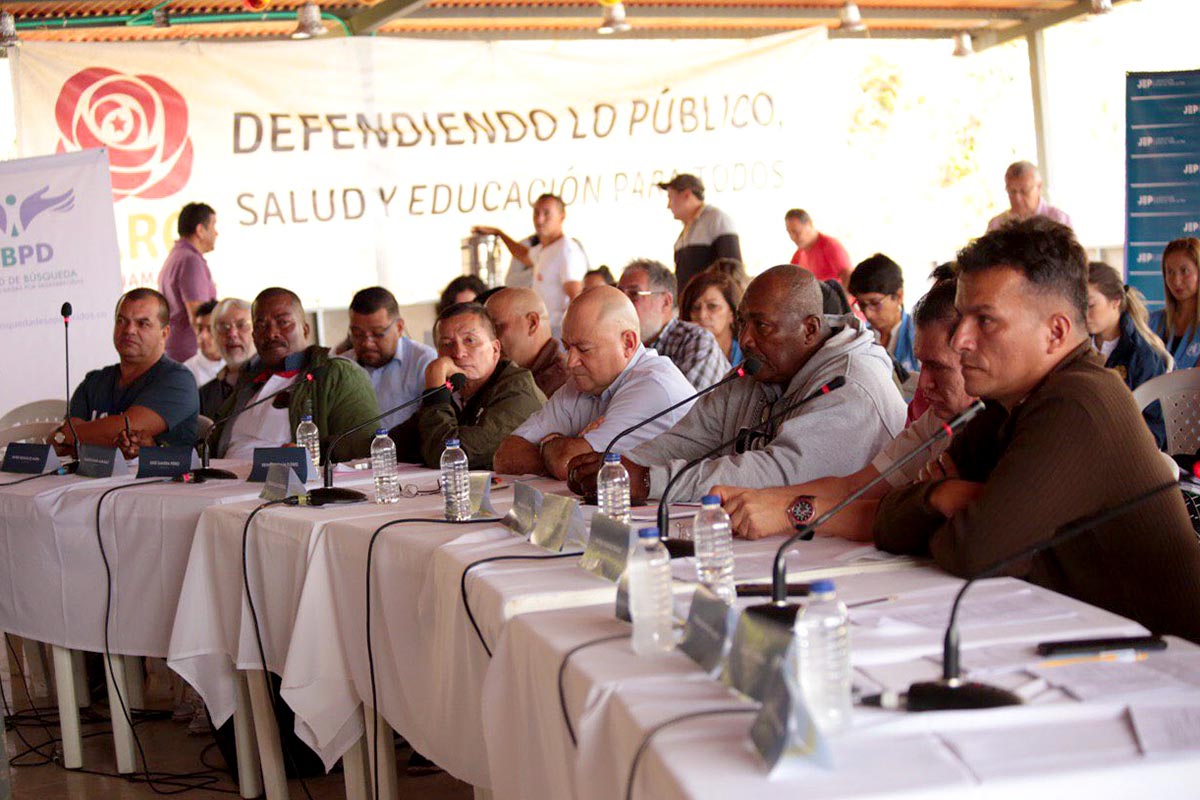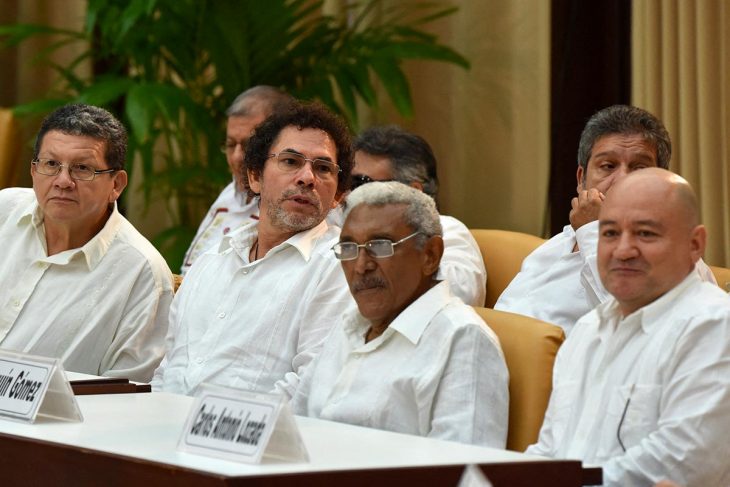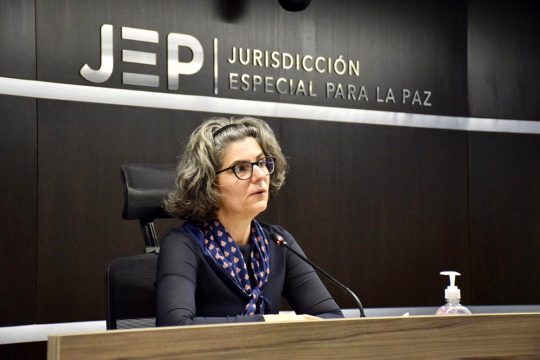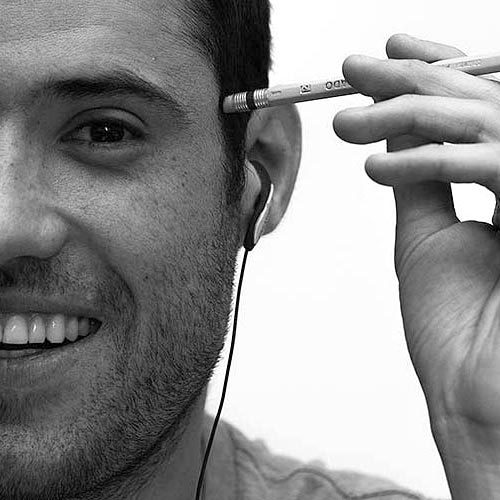“With utmost respect, we would like to address victims at the centre of the peace agreement”, began Pastor Alape, a 62-year-old former Revolutionary Armed Forces of Colombia (FARC) commander and peace negotiator, in a noticeably tremulous voice. “We are here today to acknowledge all political and legal responsibilities contained in the indictment presented to us. We’re owning up to all the events and behaviours in it”.
In a watershed moment for Colombia’s transitional justice system, which stems from the 2016 peace agreement between the government and FARC, Alape and Julián Gallo became the first former combatants to officially own up to their crimes. Over an hour-long live-streamed press conference, they outlined the former Marxist guerrilla’s response to the first indictment unveiled in late January by the Special Jurisdiction for Peace (known by Colombians as the JEP), which indicted them and six other FARC leaders.
Later that day, FARC’s legal team formally filed their 360-page response, which has not yet been made public and which kidnapping victims began receiving this week.
A historic acknowledgment
Three years after the JEP opened its doors, FARC’s announcement that it accepts the court’s findings is momentous. In first place, it seems to validate Colombia’s wager on a transitional justice system that conditions more lenient sanctions to an acknowledgement of responsibility over crimes committed and a genuine commitment to addressing victims’ demands for truth and redress.
Their admission paves the way for the first seven indicted FARC commanders to receive 5-to-8-year sentences in a non-prison setting, provided the JEP deems they’re effectively answering to victims’ demands. Had they contested its findings instead, their case would have moved to an adversarial track within the special tribunal and, if found guilty, they would be facing 15-to-20-year prison sentences.
It’s also important because of its symbolism. Kidnappings were for years FARC’s most infamous practice, with haunting images of caged and chained prisoners in the rainforest capturing media attention.
Not surprisingly, as Justice Info told, it was seen as a litmus test of whether the JEP –and the peace deal more broadly- could persuade the former guerrilla’s top brass to show contrition over their crimes and deliver justice to 2,528 victims who are registered as parties to the case, including persons who were held in captivity by FARC for as long as 14 years and their relatives.
Finally, it shows that the Colombian transitional justice’s approach seeking to prosecute at least those most responsible of the most serious crimes is yielding results. Its first indictees were all part of FARC’s Secretariat, or highest ring of power, including former commander-in-chief Rodrigo Londoño, former peace negotiators Jaime Parra, Joaquín Gómez, Rodrigo Granda and Alape, and current congressmen Pablo Catatumbo and Gallo. An eighth one, Bertulfo Alvarez, died of cancer one day before the JEP’s announcement.
What FARC is owning up to
In their public statement and their written response, former FARC leaders accept the brunt of conclusions presented by the JEP’s Judicial Panel for Acknowledgment in its 322-page document indictment on thousands of kidnappings committed between 1990 and 2012.
To begin with, they accept the JEP’s description of three broad categories or criminal policies. In first place, they admit to having kidnapped hundreds of persons with the goal of obtaining ransom for them, in what quickly became one of its main sources of funding. It was, the tribunal concluded, “a policy that turned human beings into objects whose value did not lie in their human dignity, but in the money they could bring to the armed organization”.
Second, former guerrilla leaders acknowledge having kept hundreds of persons –especially politicians, soldiers and policemen- as hostages in a bid to pressure the Colombian government into exchanging them for imprisoned rebels. FARC’s indicted leaders accepted both practices, although they seek to portray them as driven by different motivations, one being political and the other military.
Finally, FARC commanders recognised having detained hundreds of civilians and public officials in regions where they sought to assert social and territorial control, a form of kidnapping that had been mostly invisible and that the JEP documented extensively for the first time.
In its indictment, the JEP identified specific examples of abductions carried out by every one of FARC’s military structures in each of those categories. This information was the basis for its argument that all three kidnapping policies – for money, for human exchange and for territorial control - were both “systematic” and “widespread”. In total, the tribunal believes that that at least 21,396 persons were abducted by FARC over two decades.
In light of this, the JEP accused them of the war crime of “taking of hostages” and the crime against humanity of “imprisonment or other severe deprivation of physical liberty”, as well as murder, torture, sexual violence, enforced disappearance, forced displacement and other inhumane acts. It also clarified that under Colombian law they were responsible for “extortive kidnapping” and “simple kidnapping”.
FARC leaders did not challenge these assertions. As Alape said, “we recognise that, more than mistakes, we committed serious transgressions of international humanitarian law”.
Intense pain is finally acknowledged
The guerrilla’s response has heeded victims’ calls for a more comprehensive acknowledgement of their physical and emotional plight. Over the past two years, they had admitted their responsibility and expressed regret but, as Justice Info told in this story, victims were incensed by their captors’ failure to address the degrading treatments inflicted on them and the years of long suffering their families endured in their absence. Kidnappings were, in the JEP’s words, “a borderline situation that put all aspects of life in crisis.”
FARC’s response finally addresses the full scope of suffering caused by them. “Today we’re aware of the consequences that captivity had on prisoners. The pain we caused by depriving them of their freedom, without the conditions of dignity they required, the impossibility of being in touch with their loved ones, the chains and the multiple situations they had to endure during those years of captivity are not justified”, they now say, reversing course on previous claims that victims were usually treated well.
In their response, they stress their awareness of many traumas: of chained hostages, of children who grew up without their parents, of families whose relatives never returned, of photomontages designed to torture people into believing their loved ones had died, of towns whose economies were shattered by businesses gone broke, of persons forced to sell all of their possessions in order to pay for ransom, of illnesses that either went unattended or were cared for with unorthodox remedies like gunpowder, of long-term emotional and mental health issues.
“We now understand the fear, anxiety and mistrust they endured throughout this painful experience, and how it affected their daily lives after liberation. We know that their lives remain scarred,” says a poignant moment of their response, which describes kidnappings as “a reproachable deed beyond any justification” and “a contradiction of humanity”.
This wasn’t the only sensitive issue where FARC made U-turns. They also explicitly admit that some victims were subjected to sexual violence and that soldiers and policemen were subjected to degrading treatment, two realities they had shied away from before.

Answers to questions submitted by victims
FARC’s decision to own up to their crimes underscores a massive transformation. Nine years ago, at the beginning of the Havana peace talks, negotiator – turned deserter and fugitive - Jesús Santrich mocked their victims, quoting a famous bolero song to say that only “perhaps, perhaps, perhaps” they’d respond to them.
They have now gone from generic acknowledgments to more detailed expressions of remorse. At least a third of their written response comprises attempts to provide answers to the specific questions submitted by 908 victims, which the JEP gathered and forwarded to their lawyers.
“Since we began meeting and listening to victims in Havana, we have been internalising their pain,” said Alape, a former commander of the northwestern bloc who also headlined one of the still scarce public acts of contrition by FARC, in the war-ravaged town of Granada. “We can say that we’re much more conscious of assuming our political and legal responsibility, which should help lead us to an end of the armed conflict and pave the way for dialogue as the sole method to solve the conflicts that still beset us as citizens. Our willingness - which we state in our response to the indictment - is to answer to the country and to victims”.
“It’s been a lengthy, difficult process, but ours today is not an artificial position. Such transitions take time,” said Gallo, who led the guerrilla’s eastern bloc under his nom-de-guerre ‘Carlos Antonio Lozada’. This included, he explained, holding 10 different three-day workshops throughout the country with other former rebels, explaining the indictment, discussing the road ahead and gathering information to answer victims’ questions.
In particular, their response seeks to provide some information on those who never returned home. One of the JEP’s most striking revelations was how many kidnappings had tragic endings: at least 627 victims (2,9% of the total) were murdered and another 1,860 (8,7%) are still deemed missing, which is why they’re working with the Unit for the Search of persons deemed missing, which is also part of the transitional justice system.
Minor objections to the indictment
FARC did include a couple of minor objections in their response to the JEP. “We’re simply pointing out some shortcomings we see in the indictment, which in no case seek to evade any responsibility or diminish the value of the acknowledgment we’re making,” Gallo said, describing them as legal technicalities.
First, they are asking the JEP to reconsider taking soldiers and policemen as hostages as a war crime, although they accept the tribunal’s assessment that such victims suffered other crimes during their captivity. This second admission means that members of the military, although not strictly considered prisoners of war since Colombia’s armed conflict was not an international one, would still be considered by the JEP as victims of war crimes.
Second, they finally accept that sexual violence took place, but stress that it was not systematic (even though the tribunal doesn't say so). Likewise, they accept the JEP's determination on their command responsibility over kidnappings, but argue that this didn't apply to sexual violence given that they didn’t have effective control over their subordinates all the time and did punish those sexual abuse cases they heard of.
Other requests are more political. Among these, they ask the JEP to explicitly state they were politically motivated actors assisted by the right to rebel, to consider the widest possible definition of amnesties when judging other former rebels or to include more information in its final indictment on their life stories and motivations. The reasoning behind these demands is probably less linked to the tribunal’s decision and more oriented towards maintaining the morale of their former troops, many of whom still await decisions on their legal situation.
The path forward
FARC’s acknowledgment probably means that “case 01” - one of the first seven macro-cases opened by the JEP and one of two specifically focusing on that guerrilla’s deeds - will continue to move along the track seeking to strike a balance between retribution and redress, which is precisely what has made the Colombian transitional justice innovative.
Throughout this year, the JEP will announce similar decisions focusing on the roles and responsibilities of the guerrilla’s regional commanders and their subordinates, in part due to the fact that those are the more likely to know the detailed truths victims want to hear. Similar indictments are also expected soon on a second case concerning extrajudicial executions carried out by members of the Colombian military.
Several important questions still remain unanswered, including what the penalties will look exactly like – something that, as Justice Info has explained, the JEP is still due to flesh out - and whether FARC’s two indicted lawmakers, including Gallo, will be allowed to continue in Congress while serving their sentences. It’s also not clear how the tribunal will deal with their legal observations, which nonetheless require answers. On shorter notice, it will have to decide whether to organise a public ceremony in which all seven commanders formally announce their decisions and address their victims directly.
This might help their historic announcement reach more Colombians, who over the past two weeks have faced an avalanche of news linked to the country’s third serious wave of the Covid-19 pandemic and massive anti-government protests.








